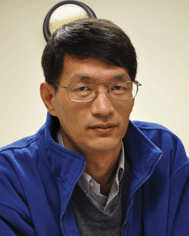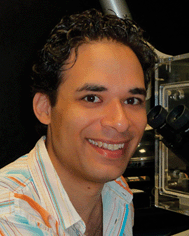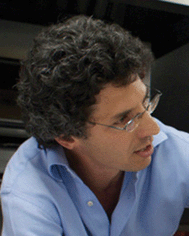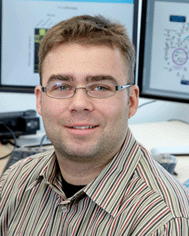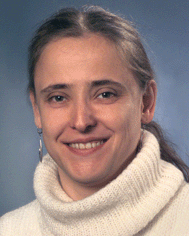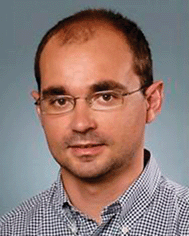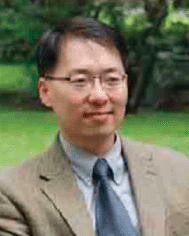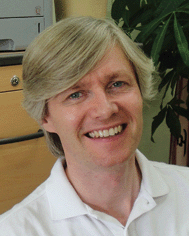DOI:
10.1039/C0MB90044C
(Profile)
Mol. BioSyst., 2011,
7, 282-283
Focus on Emerging Investigators
Kyung Bo Kim earned his BS and MS degrees from Yonsei University and the Pohang University of Science and Technology in Korea, respectively. He received his PhD from the Ohio State University in 1997. After completing his postdoctoral training with Craig Crews at Yale University, he joined the faculty of the College of Pharmacy at University of Kentucky in 2002, where he is currently an Associate Professor of Pharmaceutical Sciences. His research interests lie at the interface of chemistry and biology. In particular, his laboratory develops and utilizes novel molecular probes to unravel complex signaling pathways as well as to identify and validate novel drug targets.
Ali Kinkhabwala received his BA (1998) and PhD (2003) from Columbia University and an intervening MA (2000) from Princeton University, all in physics, during which time he pursued theoretical and observational investigations of dark matter, cosmology, neutron stars, and black holes. However, dissatisfied with the general difficulty of verifying hypotheses with data in astrophysics, he decided to switch to biology, where the hypothesis-verification cycle is much faster and where the GFP revolution had opened an unprecedented quantitative window into dynamic processes in single cells. His first postdoc was in synthetic biology in the lab of Stan Leibler at the Rockefeller University, followed by a second postdoc at the European Molecular Biology Laboratory (Heidelberg) and then at the Max Planck Institute of Molecular Physiology (Dortmund), both in the lab of Philippe Bastiaens, where he merged molecular biology, cutting-edge fluorescence microscopy techniques, data analysis, novel statistics and modeling to unravel multiple eukaryotic signaling networks—work he has continued as a group leader at the MPI since 2009.
Kent Kirshenbaum’s research explores the interface between biopolymer and synthetic polymer chemistry. He is an Associate Professor of Chemistry at New York University. Kent studied chemistry at Reed College before pursuing his PhD studies in Pharmaceutical Chemistry at the University of California, San Francisco. Working with Ken Dill, Kent contributed to an academic/industrial collaboration at Chiron Corporation, investigating the folding of peptoid oligomers. Kent conducted his post-doctoral studies with Professor David Tirrell at Caltech, where he manipulated the protein biosynthetic machinery to create proteins incorporating non-natural amino acids with useful abiotic functional groups. At NYU, Kent’s research group investigates sequence-structure-function relationships in biomimetic oligomers. Kent’s science outreach efforts include co-founding the Experimental Cuisine Collective. Kent leads classes in Biochemistry and Bioorganic Chemistry at NYU.
Thomas Kislinger received his MSc in Analytical Chemistry from the University of Munich, Germany (1998). He completed his PhD in 2001, investigating the role of Advanced Glycation Endproducts in diabetic vascular complications at the University of Erlangen, Germany and Columbia University, New York. Between 2002 and 2006 he completed a post-doctoral fellowship at the Banting and Best Department of Medical Research at the University of Toronto, using shotgun proteomics of mammalian model systems. Since 2006 he has been a Scientist at the Ontario Cancer Institute and an Assistant Professor at the University of Toronto, Department of Medical Biophysics.
Irina Kratchmarova was born in Bulgaria and obtained her MSc in Molecular biology from Sofia University, Sofia, Bulgaria. She is a group leader/Associate Professor at the Department of Biochemistry and Molecular Biology at the University of Southern Denmark. She received her PhD in Molecular Biology from the group of Prof. Karsten Kristiansen at Odense University in 2001. After post-doctoral work at the Prof. Matthias Mann laboratory at the University of Southern Denmark, she established her own research group in 2005. Her research focuses on the elucidation of mechanisms of cellular differentiation and cell signaling in adult and stem cells, in particular analyzing the changes occurring in the secretomes during the differentiation program using mass spectrometry-based quantitative approaches.
Boris Macek was born in Croatia, in 1975. He received his PhD in Biology from the University of Münster, Germany in 2003. From 2004 to 2008 he was a postdoctoral research fellow in the laboratory of Matthias Mann at the University of Southern Denmark and the Max Planck Institute for Biochemistry in Martinsried, Germany. In late 2008 he was appointed Junior Professor for Quantitative Proteomics and Director of the Proteome Center at the University of Tübingen, Germany. His current research interests are: proteogenomics; comparative proteomics; protein phosphorylation networks in bacteria and the detection of kinase substrates in prokaryotic and eukaryotic systems.
Seung Bum Park received his PhD degree in chemistry from Texas A&M University working with Professor Robert F. Standaert in 2001. After postdoctoral research under the guidance of Professor Stuart L. Schreiber at Harvard University, he was appointed as an Assistant Professor in the Chemistry Department at Seoul National University in 2004, and then promoted to an Associate Professor with tenure in early 2008. He took up a joint faculty position in the Department of Biophysics and Chemical Biology at Seoul National University. His research interests lie in chemical biology, diversity-oriented synthesis, discovery of fluorescent bioprobes, medicinal & combinatorial chemistry, high-throughput screening, and target identification.
Darren Williams obtained his PhD in 1998 at Imperial College of Science, Technology and Medicine, in the laboratory of Professor Terrence Partridge. From 2002–2008, he carried out postdoctoral studies at New York University School of Medicine and Yonsei University Department of Chemistry, utilizing forward chemical genetics to discover new modulators of pigmentation, neurogenesis and apoptosis. He met his future wife, Professor Da-Woon Jung, at NYU and they relocated to Korea to start a family. He was appointed assistant professor at the Gwangju Institute of Science and Technology in 2009. His research focuses on drug discovery for treating cancer, diabetes and controlling stem cell function.
|
| This journal is © The Royal Society of Chemistry 2011 |
Click here to see how this site uses Cookies. View our privacy policy here. 
